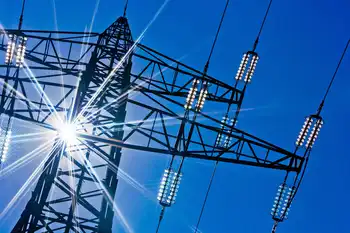EV Charging Grid Readiness addresses how rising EV adoption, larger batteries, and fast charging affect electric utilities, using vehicle-to-grid, energy storage, mobile and temporary chargers, and smart charging to mitigate distribution stress.
Key Points
Planning and tech to manage EV load growth with V2G, storage and smart charging to avoid overloads on distribution grids.
✅ Lithium-ion costs may drop 60%, enabling new charger models
✅ Mobile and temporary chargers buffer local distribution peaks
✅ Smart charging and V2G defer transformer and feeder upgrades
The impacts of COVID-19 likely mean flat electric vehicle (EV) sales this year, but a trio of new reports say the long-term outlook is for strong growth — which means the electric grid and especially state power grids will need to respond.
As EV adoption grows, newer vehicles will put greater stress on the electric grid due to their larger batteries and capacity for faster charging, according to Rhombus Energy Solutions, while a DOE lab finds US electricity demand could rise 38% as EV adoption scales. A new white paper from the company predicts the cost of lithium-ion batteries will drop by 60% over the next decade, helping enable a new set of charging solutions.
Meanwhile, mobile and temporary EV charging will grow from 0.5% to 2% of the charging market by 2030, according to new Guidehouse research. The overall charging market is expected to reach reach almost $16 billion in revenues in 2020 and more than $60 billion by 2030. A third report finds long-range EVs are growing their share of the market as well, and charging them could cause stress to electric distribution systems.
"One can expect that the number of EVs in fleets will grow very rapidly over the next ten years," according to Rhombus' report. But that means many fleet staging areas will have trouble securing sufficient charging capacity as electric truck fleets scale up.
"Given the amount of time it takes to add new megawatt-level power feeds in most cities (think years), fleet EVs will run into a significant 'power crisis' by 2030," according to Rhombus.
"Grid power availability will become a significant problem for fleets as they increase the number of electric vehicles they operate," Rhombus CEO Rick Sander said in a statement. "Integrating energy storage with vehicle-to-grid capable chargers and smart [energy management system] solutions as seen in California grid stability efforts is a quick and effective mitigation strategy for this issue."
Along with energy storage, Guidehouse says a new, more flexible approach to charger deployment enabled by grid coordination strategies will help meet demand. That means chargers deployed by a van or other mobile stations, and "temporary" chargers that can help fleets expand capacity.
According to Guidehouse, the temporary units "are well positioned to de-risk large investments in stationary charging infrastructure" while also providing charge point networks and service providers "with new capabilities to flexibly supply predictable changes in EV transportation behaviors and demand surges."
"Mobile charging is a bit of a new area in the EV charging scene. It primarily leverages batteries to make chargers mobile, but it doesn't necessarily have to," Guidehouse Senior Research Analyst Scott Shepard told Utility Dive.
"The biggest opportunity is with the temporary charging format," said Shepard. "The bigger units are meant to be located at a certain site for a period of time. Those units are interesting because they create a little more scale-ability for sites and a little risk mitigation when it comes to investing in a site."
"Utilities could use temporary chargers as a way to provide more resilient service, using these chargers in line with on-site generation," Shepard said.
Increasing rates of EV adoption, combined with advances in battery size and charging rates, "will impact electric utility distribution infrastructure at a higher rate than previously projected," according to new analysis from FleetCarma.
The charging company conducted a study of over 3,900 EVs, illustrating the rapid change in vehicle capabilities in just the last five years. According to FleetCarma, today's EVs use twice as much energy and draw it at twice the power level. The long-range EV has increased as a proportion of new electric vehicle sales from 14% in 2014 to 66% in 2019 in the United States, it found.
Long-range EVs "are very different from older electric vehicles: they are driven more, they consume more energy, they draw power at a higher level and they are less predictable," according to FleetCarma.
Guidehouse analysts say grid modernization efforts and energy storage can help smooth the impacts of charging larger vehicles.
Mobile and temporary charging solutions can act as a "buffer" to the distribution grid, according to Guidehouse's report, allowing utilities to avoid or defer some transmission and distribution upgrade costs that could be required due to stress on the grid from newer vehicles.
"At a high level, there's enough power and energy to supply EVs with proper management in place," said Shepard. "And in a lot of different locations, those charging deployments will be built in a way that protects the grid. Public fast charging, large commercial sites, they're going to have the right infrastructure embedded."
"But for certain areas of the grid where there is low visibility, there is the potential for grid disruption and questions about whether the UK grid can cope with EV demand," said Shepard. "This has been on the mind of utilities but never realized: overwhelming residential transformers."
As EVs with higher charging and energy capacities are connected to the grid, Shepard said, "you are going to start to see some of those residential systems come under pressure, and probably see increased incidences of having to upgrade transformers." Some residential upgrades can be deferred through smarter charging programs, he added.
Related News












